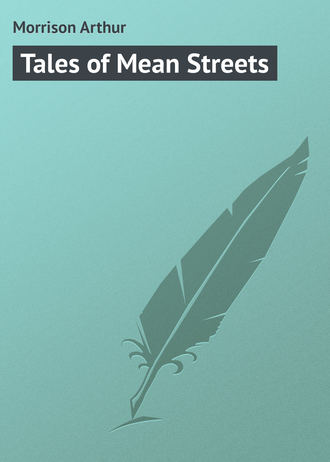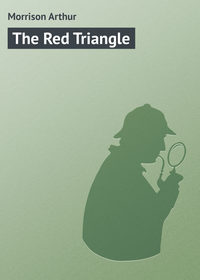 полная версия
полная версияTales of Mean Streets

Morrison Arthur
Tales of Mean Streets
INTRODUCTION TO THE AMERICAN EDITION
It was considered an intrepid thing for Walter Besant to do when, twelve or thirteen years ago, he invaded the great East End of London and drew upon its unknown wealth of varied material to people that most charming novel, "All Sorts and Conditions of Men." Until then the West End knew little of its contiguous neighbor in the East. Dickens's kaleidoscopic views of low life in the South of London were manifestly caricatures of the slum specimens of human nature which he purposely sought and often distorted to suit his bizarre humor. Mr. Besant may be fairly considered as the pioneer of those who have since descended to the great unchartered region of East London, about which, so far as our knowledge of the existing conditions of human life in that community are concerned, we remained until, as it were yesterday, almost as ignorant as of the undiscovered territories in Central Africa. Contemporaneous with Mr. Besant's "discovery" of East London began the eastward march of the Salvation Army, which has since honeycombed this quarter of the metropolis with its militant camps. Gradually the barriers were thrown down, and the East has become accessible to literature and to civilization as it never had been to the various Charity and Church missionary organizations.
It was as the secretary of an old Charity Trust that Mr. Arthur Morrison first made his acquaintance with East London, and by dint of several years' residence and attentive study acquired his knowledge of the East End and its myriad denizens. Right in the midst of the great square bounded by the Thames, the Lea, the City, Kingsland, and the Hackney open spaces lie the dreary "Mean Streets" which Mr. Morrison has described with uncommon power and vigor, and among which the operations of his secretaryship engaged him laboriously for years. The possibility of presenting his observations of East London in narrative form began to grow upon him while casting around for literary pabulum to convert into magazine articles, and in October, 1891, appeared his first sketch, entitled "A Street," in "Macmillan's Magazine." This, in a remodelled form, now serves as an introductory chapter to the present collection. The article in "Macmillan's" attracted a good deal of attention, and won for its author the good fellowship of Mr. W. E. Henley, who encouraged him in his idea of writing a series of short stories and studies which should describe East End life with austerity, restraint, and frankness. A large number of the "Tales" appeared in the "National Observer" and several followed in the "Pall Mall Budget." The dedication to Mr. Henley of "Tales of Mean Streets" is a grateful acknowledgment by the author of the kindly and frank counsel of his friendly critic; whose criticism, it may be added, has been mainly directed towards the author's craftsmanship – his conceptions of the life he was portraying the critic was wise enough to let alone. Mr. Morrison has also been indebted on the side of art in fiction to Mr. Walter Besant, whom he met in the East End.
Mr. Morrison has been fortunate in his literary experience. He is another witness to the fact that merit makes its way from the outside, without necessarily receiving aid or having influence brought to bear on editors or publishers. It is curious to note that a manuscript of his which happened to be rejected once was accepted on the day following, and now has a place in this book. Some cycling verses contributed as a lad to a cycling magazine began his literary career, and for some years he continued to write on what was then a novel sport. He drifted into broader channels and became a frequent contributor to popular papers and magazines. During this period he was working on the Charity Commission, and wrote only by way of relaxation. About five years ago he resigned his office on the Trust, and, occupying chambers near the Strand, joined the editorial staff of an old-established evening paper, where for some months he continued to write leaderettes and miscellaneous articles and notes until, becoming convinced that he could not do justice to such ability for better work which he might possess amidst the grinding routine of newspaper scribbling, he gave up his post and applied himself to more serious writing, contributing to the "Strand," and other magazines and reviews. About this time he began the series which is now gathered under the common title "Tales of Mean Streets." On its recent publication in England it was received with instant recognition as a book of extraordinary merit, and it has met with signal success. Some idea of the strong impression which it has made in England may be gathered from Mr. Arthur Waugh's warm tribute to the author's distinction in a recent letter to the "Critic." "He deals exclusively," writes Mr. Waugh, "with life in the East End of London, and he does so with a fearlessness and originality which are of more value than many sermons. I do not know whether his book is published in America; but if so, I strongly advise every reader of this letter to secure it. Those who do so will learn from its pages more of the degradation and misery of a certain side of London life than they could in many weeks of philanthropic 'slumming.' Mr. Morrison's will be a name to conjure with in another season."
Mr. Arthur Morrison is but thirty-one, and has just stepped on to the threshold of literary fame as a writer of decided promise and strength. He has only broken ground as yet in the field which has brought him his spurs, and is at present contemplating a longer story of East End life. The number of those who have attempted to write familiarly of the seamy side of our great cities from close observation and laborious study of its life in a first-hand fashion is so small that it is easy to believe that the author of "Tales of Mean Streets," possessing as he does the prime qualities of a novelist, has a future before him in an unprecedented form of literature.
JAMES MACARTHUR.New York, March 2, 1895.INTRODUCTION
A STREETThis street is in the East End. There is no need to say in the East End of what. The East End is a vast city, as famous in its way as any the hand of man has made. But who knows the East End? It is down through Cornhill and out beyond Leadenhall Street and Aldgate Pump, one will say: a shocking place, where he once went with a curate; an evil plexus of slums that hide human creeping things, where filthy men and women live on penn'orths of gin, where collars and clean shirts are decencies unknown, where every citizen wears a black eye, and none ever combs his hair. The East End is a place, says another, which is given over to the Unemployed. And the Unemployed is a race whose token is a clay pipe, and whose enemy is soap: now and again it migrates bodily to Hyde Park with banners, and furnishes adjacent police courts with disorderly drunks. Still another knows the East End only as the place whence begging letters come; there are coal and blanket funds there, all perennially insolvent, and everybody always wants a day in the country. Many and misty are people's notions of the East End; and each is commonly but the distorted shadow of a minor feature. Foul slums there are in the East End, of course, as there are in the West; want and misery there are, as wherever a host is gathered together to fight for food. But they are not often spectacular in kind.
Of this street there are about one hundred and fifty yards – on the same pattern all. It is not pretty to look at. A dingy little brick house twenty feet high, with three square holes to carry the windows, and an oblong hole to carry the door, is not a pleasing object; and each side of this street is formed by two or three score of such houses in a row, with one front wall in common. And the effect is as of stables.
Round the corner there are a baker's, a chandler's, and a beer-shop. They are not included in the view from any of the rectangular holes; but they are well known to every denizen, and the chandler goes to church on Sunday and pays for his seat. At the opposite end, turnings lead to streets less rigidly respectable: some where "Mangling done here" stares from windows, and where doors are left carelessly open; others where squalid women sit on doorsteps, and girls go to factories in white aprons. Many such turnings, of as many grades of decency, are set between this and the nearest slum.
They are not a very noisy or obtrusive lot in this street. They do not go to Hyde Park with banners, and they seldom fight. It is just possible that one or two among them, at some point in a life of ups and downs, may have been indebted to a coal and blanket fund; but whosoever these may be, they would rather die than publish the disgrace, and it is probable that they very nearly did so ere submitting to it.
Some who inhabit this street are in the docks, some in the gasworks, some in one or other of the few shipbuilding yards that yet survive on the Thames. Two families in a house is the general rule, for there are six rooms behind each set of holes: this, unless "young men lodgers" are taken in, or there are grown sons paying for bed and board. As for the grown daughters, they marry as soon as may be. Domestic service is a social descent, and little under millinery and dressmaking is compatible with self-respect. The general servant may be caught young among the turnings at the end where mangling is done; and the factory girls live still further off, in places skirting slums.
Every morning at half-past five there is a curious demonstration. The street resounds with thunderous knockings, repeated upon door after door, and acknowledged ever by a muffled shout from within. These signals are the work of the night-watchman or the early policeman, or both, and they summon the sleepers to go forth to the docks, the gasworks, and the ship-yards. To be awakened in this wise costs fourpence a week, and for this fourpence a fierce rivalry rages between night-watchmen and policemen. The night-watchman – a sort of by-blow of the ancient "Charley," and himself a fast vanishing quantity – is the real professional performer; but he goes to the wall, because a large connection must be worked if the pursuit is to pay at fourpence a knocker. Now, it is not easy to bang at two knockers three-quarters of a mile apart, and a hundred others lying between, all punctually at half-past five. Wherefore the policeman, to whom the fourpence is but a perquisite, and who is content with a smaller round, is rapidly supplanting the night-watchman, whose cry of "Past nine o'clock," as he collects orders in the evening, is now seldom heard.
The knocking and the shouting pass, and there comes the noise of opening and shutting of doors, and a clattering away to the docks, the gasworks and the ship-yards. Later more door-shutting is heard, and then the trotting of sorrow-laden little feet along the grim street to the grim Board School three grim streets off. Then silence, save for a subdued sound of scrubbing here and there, and the puny squall of croupy infants. After this, a new trotting of little feet to docks, gasworks, and ship-yards with father's dinner in a basin and a red handkerchief, and so to the Board School again. More muffled scrubbing and more squalling, and perhaps a feeble attempt or two at decorating the blankness of a square hole here and there by pouring water into a grimy flower-pot full of dirt. Then comes the trot of little feet toward the oblong holes, heralding the slower tread of sooty artisans; a smell of bloater up and down; nightfall; the fighting of boys in the street, perhaps of men at the corner near the beer-shop; sleep. And this is the record of a day in this street; and every day is hopelessly the same.
Every day, that is, but Sunday. On Sunday morning a smell of cooking floats round the corner from the half-shut baker's, and the little feet trot down the street under steaming burdens of beef, potatoes, and batter pudding – the lucky little feet these, with Sunday boots on them, when father is in good work and has brought home all his money; not the poor little feet in worn shoes, carrying little bodies in the threadbare clothes of all the week, when father is out of work, or ill, or drunk, and the Sunday cooking may very easily be done at home, – if any there be to do.
On Sunday morning one or two heads of families appear in wonderful black suits, with unnumbered creases and wrinklings at the seams. At their sides and about their heels trot the unresting little feet, and from under painful little velvet caps and straw hats stare solemn little faces towelled to a polish. Thus disposed and arrayed, they fare gravely through the grim little streets to a grim Little Bethel where are gathered together others in like garb and attendance; and for two hours they endure the frantic menace of hell-fire.
Most of the men, however, lie in shirt and trousers on their beds and read the Sunday paper; while some are driven forth – for they hinder the housework – to loaf, and await the opening of the beer-shop round the corner. Thus goes Sunday in this street, and every Sunday is the same as every other Sunday, so that one monotony is broken with another. For the women, however, Sunday is much as other days, except that there is rather more work for them. The break in their round of the week is washing day.
No event in the outer world makes any impression in this street. Nations may rise, or may totter in ruin; but here the colorless day will work through its twenty-four hours just as it did yesterday, and just as it will to-morrow. Without there may be party strife, wars and rumors of wars, public rejoicings; but the trotting of the little feet will be neither quickened nor stayed. Those quaint little women, the girl-children of this street, who use a motherly management toward all girl-things younger than themselves, and toward all boys as old or older, with "Bless the child!" or "Drat the children!" – those quaint little women will still go marketing with big baskets, and will regard the price of bacon as chief among human considerations. Nothing disturbs this street – nothing but a strike.
Nobody laughs here – life is too serious a thing; nobody sings. There was once a woman who sang – a young wife from the country. But she bore children, and her voice cracked. Then her man died, and she sang no more. They took away her home, and with her children about her skirts she left this street forever. The other women did not think much of her. She was "helpless."
One of the square holes in this street – one of the single, ground-floor holes – is found, on individual examination, to differ from the others. There has been an attempt to make it into a shop-window. Half a dozen candles, a few sickly sugar-sticks, certain shrivelled bloaters, some bootlaces, and a bundle or two of firewood compose a stock which at night is sometimes lighted by a little paraffine lamp in a tin sconce, and sometimes by a candle. A widow lives here – a gaunt, bony widow, with sunken, red eyes. She has other sources of income than the candles and the bootlaces: she washes and chars all day, and she sews cheap shirts at night. Two "young men lodgers," moreover, sleep upstairs, and the children sleep in the back room; she herself is supposed not to sleep at all. The policeman does not knock here in the morning – the widow wakes the lodgers herself; and nobody in the street behind ever looks out of window before going to bed, no matter how late, without seeing a light in the widow's room where she plies her needle. She is a quiet woman, who speaks little with her neighbors, having other things to do: a woman of pronounced character, to whom it would be unadvisable – even dangerous – to offer coals or blankets. Hers was the strongest contempt for the helpless woman who sang: a contempt whose added bitterness might be traced to its source. For when the singing woman was marketing, from which door of the pawnshop had she twice met the widow coming forth?
This is not a dirty street, taken as a whole. The widow's house is one of the cleanest, and the widow's children match the house. The one house cleaner than the widow's is ruled by a despotic Scotchwoman, who drives every hawker off her whitened step, and rubs her door handle if a hand have rested on it. The Scotchwoman has made several attempts to accommodate "young men lodgers," but they have ended in shrill rows.
There is no house without children in this street, and the number of them grows ever and ever greater. Nine-tenths of the doctor's visits are on this account alone, and his appearances are the chief matter of such conversation as the women make across the fences. One after another the little strangers come, to live through lives as flat and colorless as the day's life in this street. Existence dawns, and the doctor-watchman's door knock resounds along the row of rectangular holes. Then a muffled cry announces that a small new being has come to trudge and sweat its way in the appointed groove. Later, the trotting of little feet and the school; the midday play hour, when love peeps even into this street; after that more trotting of little feet – strange little feet, new little feet – and the scrubbing, and the squalling, and the barren flower-pot; the end of the sooty day's work; the last home-coming; nightfall; sleep.
When love's light falls into some corner of the street, it falls at an early hour of this mean life, and is itself but a dusty ray. It falls early, because it is the sole bright thing which the street sees, and is watched for and counted on. Lads and lasses, awkwardly arm in arm, go pacing up and down this street, before the natural interest in marbles and doll's houses would have left them in a brighter place. They are "keeping company"; the manner of which proceeding is indigenous – is a custom native to the place. The young people first "walk out" in pairs. There is no exchange of promises, no troth-plight, no engagement, no love-talk. They patrol the street side by side, usually in silence, sometimes with fatuous chatter. There are no dances, no tennis, no water-parties, no picnics to bring them together: so they must walk out, or be unacquainted. If two of them grow dissatisfied with each other's company, nothing is easier than to separate and walk out with somebody else. When by these means each has found a fit mate (or thinks so), a ring is bought, and the odd association becomes a regular engagement; but this is not until the walking out has endured for many months. The two stages of courtship are spoken of indiscriminately as "keeping company," but a very careful distinction is drawn between them by the parties concerned. Nevertheless, in the walking out period it would be almost as great a breach of faith for either to walk out with more than one, as it would be if the full engagement had been made. And love-making in this street is a dreary thing, when one thinks of love-making in other places. It begins – and it ends – too soon.
Nobody from this street goes to the theatre. That would mean a long journey, and it would cost money which might buy bread and beer and boots. For those, too, who wear black Sunday suits it would be sinful. Nobody reads poetry or romance. The very words are foreign. A Sunday paper in some few houses provides such reading as this street is disposed to achieve. Now and again a penny novel has been found among the private treasures of a growing daughter, and has been wrathfully confiscated. For the air of this street is unfavorable to the ideal.
Yet there are aspirations. There has lately come into the street a young man lodger who belongs to a Mutual Improvement Society. Membership in this society is regarded as a sort of learned degree, and at its meetings debates are held and papers smugly read by lamentably self-satisfied young men lodgers, whose only preparation for debating and writing is a fathomless ignorance. For ignorance is the inevitable portion of dwellers here: seeing nothing, reading nothing, and considering nothing.
Where in the East End lies this street? Everywhere. The hundred and fifty yards is only a link in a long and a mightily tangled chain – is only a turn in a tortuous maze. This street of the square holes is hundreds of miles long. That it is planned in short lengths is true, but there is no other way in the world that can more properly be called a single street, because of its dismal lack of accent, its sordid uniformity, its utter remoteness from delight.
LIZERUNT
LIZERUNT.
I. LIZER'S WOOING
Somewhere in the register was written the name Elizabeth Hunt; but seventeen years after the entry the spoken name was Lizerunt. Lizerunt worked at a pickle factory, and appeared abroad in an elaborate and shabby costume, usually supplemented by a white apron. Withal she was something of a beauty. That is to say, her cheeks were very red, her teeth were very large and white, her nose was small and snub, and her fringe was long and shiny; while her face, new-washed, was susceptible of a high polish. Many such girls are married at sixteen, but Lizerunt was belated, and had never a bloke at all.
Billy Chope was a year older than Lizerunt. He wore a billycock with a thin brim and a permanent dent in the crown; he had a bobtail coat, with the collar turned up at one side and down at the other, as an expression of independence; between his meals he carried his hands in his breeches pockets; and he lived with his mother, who mangled. His conversation with Lizerunt consisted long of perfunctory nods; but great things happened this especial Thursday evening, as Lizerunt, making for home, followed the fading red beyond the furthermost end of Commercial Road. For Billy Chope, slouching in the opposite direction, lurched across the pavement as they met, and, taking the nearer hand from his pocket, caught and twisted her arm, bumping her against the wall.
"Garn," said Lizerunt, greatly pleased: "le' go!" For she knew that this was love.
"Where yer auf to, Lizer?"
"'Ome, o' course, cheeky. Le' go;" and she snatched – in vain – at Billy's hat.
Billy let go, and capered in front of her. She feigned to dodge by him, careful not to be too quick, because affairs were developing.
"I say, Lizer," said Billy, stopping his dance and becoming business-like, "goin' anywhere Monday?"
"Not along o' you, cheeky; you go 'long o' Beller Dawson, like wot you did Easter."
"Blow Beller Dawson; she ain't no good. I'm goin' on the Flats. Come?"
Lizerunt, delighted but derisive, ended with a promise to "see." The bloke had come at last, and she walked home with the feeling of having taken her degree. She had half assured herself of it two days before, when Sam Cardew threw an orange peel at her, but went away after a little prancing on the pavement. Sam was a smarter fellow than Billy, and earned his own living; probably his attentions were serious; but one must prefer the bird in hand. As for Billy Chope, he went his way, resolved himself to take home what mangling he should find his mother had finished, and stick to the money; also, to get all he could from her by blandishing and bullying, that the jaunt to Wanstead Flats might be adequately done.
There is no other fair like Whit Monday's on Wanstead Flats. Here is a square mile and more of open land where you may howl at large; here is no danger of losing yourself, as in Epping Forest; the public houses are always with you; shows, shies, swings, merry-go-rounds, fried fish stalls, donkeys, are packed closer than on Hampstead Heath; the ladies' tormentors are larger, and their contents smell worse, than at any other fair. Also, you may be drunk and disorderly without being locked up, – for the stations won't hold everybody, – and when all else has palled, you may set fire to the turf. Hereinto Billy and Lizerunt projected themselves from the doors of the Holly Tree on Whit Monday morning. But through hours on hours of fried fish and half-pints both were conscious of a deficiency. For the hat of Lizerunt was brown and old; plush it was not, and its feather was a mere foot long, and of a very rusty black. Now, it is not decent for a factory girl from Limehouse to go bank-holidaying under any but a hat of plush, very high in the crown, of a wild blue or a wilder green, and carrying withal an ostrich feather, pink or scarlet or what not; a feather that springs from the fore part, climbs the crown, and drops as far down the shoulders as may be. Lizerunt knew this, and, had she had no bloke, would have stayed at home. But a chance is a chance. As it was, only another such hapless girl could measure her bitter envy of the feathers about her, or would so joyfully have given an ear for the proper splendor. Billy, too, had a vague impression, muddled by but not drowned in half-pints, that some degree of plush was condign to the occasion and to his own expenditure. Still, there was no quarrel; and the pair walked and ran with arms about each other's necks; and Lizerunt thumped her bloke on the back at proper intervals; so that the affair went regularly on the whole: although, in view of Lizerunt's shortcomings, Billy did not insist on the customary exchange of hats. Everything, I say, went well and well enough until Billy bought a ladies' tormentor and began to squirt it at Lizerunt. For then Lizerunt went scampering madly, with piercing shrieks, until her bloke was left some little way behind, and Sam Cardew, turning up at that moment and seeing her running alone in the crowd, threw his arms about her waist and swung her round him again and again, as he floundered gallantly this way and that, among the shies and the hokey-pokey barrows.






